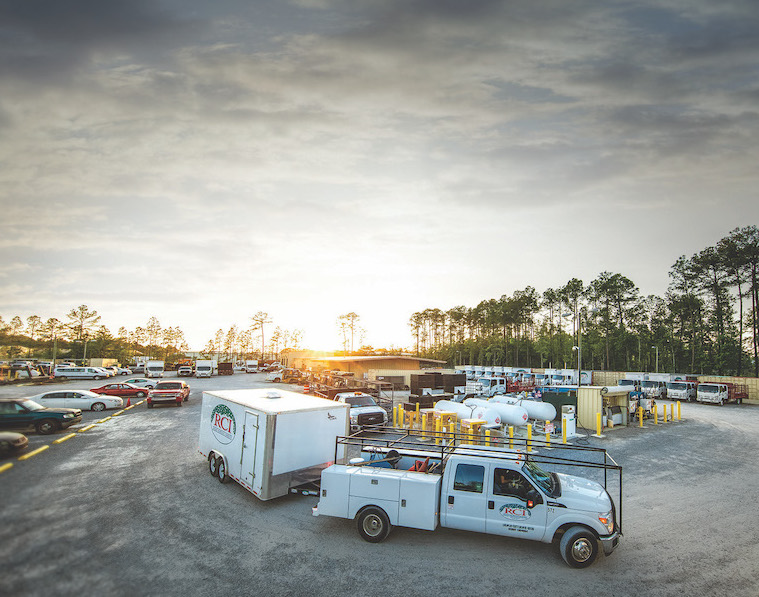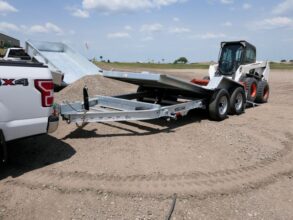How Landscape Contractors Benefit from Propane Autogas Vehicles

By Jeremy Wishart
It’s no secret that landscape contractors can benefit from adding propane-powered commercial mowers to their fleet. Using the alternative fuel can reduce costs and emissions, while increasing crew productivity. It’s led to propane becoming the fuel of choice in more than 27,000 mowers throughout the United States as of this summer.

But contractors may not realize that there is more than one way to capitalize on propane’s advantages for their companies. Often, the vehicles used by landscape contractors can also run on propane autogas.
In fact, propane autogas is the third most common vehicle fuel in the world behind gasoline and diesel. It’s a proven alternative fuel trusted in fleets throughout the United States and, increasingly, in fleets used for landscaping, hardscaping, and turf maintenance. Vehicles using propane autogas can go beyond meeting a contractor’s needs for hauling equipment or carrying crews, and add value to a company’s bottom line throughout the life of a vehicle.
By converting to propane autogas, contractors can see benefits throughout the life of a vehicle, including low total cost of ownership, availability for use in a wide variety of vehicles, reduced emissions, and flexible refueling options.
Lowest total cost-of-ownership
Contractors who use propane mowers know that several factors contribute to the savings they can see over the life of a mower, including reduced fuel and maintenance costs. Similarly, propane autogas vehicles have the lowest total cost of ownership than comparable electric, gasoline, or diesel vehicles for multiple reasons.
The cost of fuel is one big reason. On average, propane autogas costs between 30 and 50 percent less per gallon than gasoline and diesel. The price of propane traditionally falls between the prices of natural gas and oil, which greatly limits market price fluctuations compared to the wild price swings that gasoline and diesel often have in a given season. This cost consistency can be a major advantage for contractors in planning budgets for a season — particularly with a third of the country already seeing prices above $2.80 per gallon and rising for regular octane gasoline, based on state averages from the AAA. Contractors can further protect themselves from fuel fluctuations by establishing a fuel contract with a propane supplier, which holds the price per gallon for a set period of time.
Propane autogas refueling costs are also stable throughout the day. In contrast, electricity costs vary throughout the day, particularly during high-demand periods in summer months, and will increase if a station draws too much power at once. It’s also important to keep in mind that as more users add electric vehicles and equipment, additional stress will be placed on local power grids to meet demand.
Propane autogas vehicles eliminate many of the challenges that contractors face if using diesel trucks. Propane autogas engines and emissions systems are less complex, and ultimately eliminate the need for emissions fluids. Diesel engines also require complex particulate filters to meet emissions regulations, which require additional downtime and costs to periodically clean and replace.
Versatile conversion kits
There’s no one-size-fits-all vehicle when it comes to meeting the needs of landscape contractors. Vehicles need to be able to carry crews and equipment, haul trailers, or operate in cold weather for companies that offer snow removal services.
A number of high-demand light- and medium-duty trucks and vans can be converted to run on propane autogas from gasoline with an EPA- or CARB-certified conversion kit, including chassis models upfitted with dump bodies, cranes, or box options for contractors who may use these for hardscaping operations. Multiple conversion kit partners are also available throughout the United States to assist with converting existing fleets to propane autogas.
Propane autogas vehicles have power comparable to gasoline-fueled vehicles, even when pulling loaded trailers. Contractors will likely find that propane autogas is ultimately more efficient in fuel costs per mile compared to gasoline. Additionally, the fuel is much easier to start in cold weather because it won’t gel or freeze, a common issue with diesel trucks, making it advantageous for contractors using light- or medium-duty trucks for snow and ice removal and allowing work to continue seamlessly no matter the season.
Reduced emissions
Another advantage that propane autogas offers is reduced emissions compared to gasoline and diesel vehicles. Propane autogas engines are actually more than 90 percent cleaner than any standards mandated by the EPA. Compared to gasoline vehicles, using propane autogas produces up to 22 percent fewer greenhouse gas emissions throughout the full fuel cycle, and up to 36 percent fewer nitrous oxide emissions than diesel vehicles.
As sustainable and environmentally friendly services continue to grow, use of propane autogas can help contractors reach new green-minded customers, especially when used alongside propane-powered mowers.
Flexible refueling options
Propane autogas has several convenient, cost-effective refueling options that contractors can add to home offices or equipment facilities.
Depending on the size of a contractor’s fleet, a standard or advanced private station can be installed on site. For both options, contractors are responsible for site preparation, electrical supply for the pump and dispensers, and the installation of crash protection. In some instances, fleets may have a choice of leasing or owning refueling infrastructure from either a propane supplier or infrastructure provider.
For fleets with fewer than 50 vehicles, a standard private station is the best option. This includes a 1,000- to 3,000-gallon propane tank, plus one or more propane autogas fuel dispensers. An advanced private station is recommended for fleets with more than 50 vehicles. This option includes larger fuel storage tanks with sufficient capacity to meet a contractor’s needs and two or more fuel dispensers. Overhead canopies may be added for protection from the weather during refueling.
Mobile refueling options can also allow contractors to take advantage of the benefits of propane autogas without installing permanent infrastructure. If this convenient solution is available, contractors can work with a propane supplier to create a customized plan for refueling vehicles on site with a bobtail delivery truck.
Another option that requires no infrastructure investment is identifying and utilizing existing propane autogas refueling network stations. There are public and private refueling networks that provide fuel for fleets of all sizes. Refueling networks provide 24/7 security and convenience and use a card lock system that tracks fuel usage and costs per vehicle, while providing convenience along routes. A complete list of public refueling stations is available from the U.S. Alternative Fuels Data Center.
By incorporating propane autogas, landscape contractors can see all the benefits of a proven alternative fuel beyond a mower fleet. For more information on how propane autogas can work in landscape and turf maintenance operations, visit Propane.com/Propane-One-Fuel-Solution.
Jeremy Wishart is the director of off-road business development at the Propane Education & Research Council. He can be reached at jeremy.wishart@propane.com.


